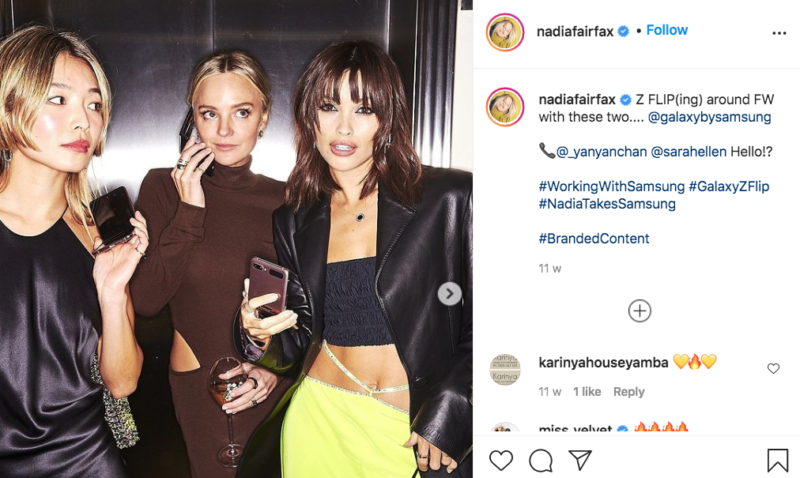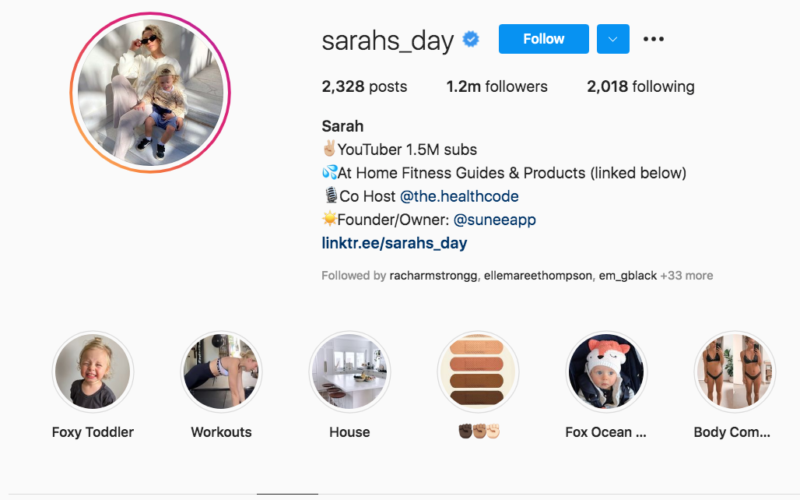
Updated: Influencer posts for Samsung and Tropeaka breach Ad Standards
Two recent Instagram posts have breached the Australian Association of National Advertisers (AANA) distinguishable advertising rules, in recent determinations by Ad Standards.
One post by Nadia Fairfax (@nadiafairfax), dated 2 June, features three women holding phones, with the caption: “Z FLIP(ing) around FW with these two…. @galaxybysamsung’.
The post also included the tags #WorkingWithSaumsuing #GalaxyZFlip #NadiaTakesSamsung, and received complaints that it is clearly advertising but hasn’t been declared.
In its initial response, Samsung revealed that Fairfax has been engaged by Samsung as an influencer for seven years, but asserted that the post in question was “not part of the deliverables” under the working agreement.
“Samsung’s position is that the post is not advertising. However, if the Post is deemed to be advertising, Samsung submits that it is appropriately distinguishable as advertising,” Samsung said.
Samsung then requested the complaint be dismissed because the post does not fall within “the scope of advertising covered by the Code, since Samsung did not have reasonable control over it, but that, in any event, the Post was clearly identifiable as being commercial in nature.”

The post has since been updated with #BrandedContent
In its consideration, the Ad Standards Community Panel found that while the post was outside of the agreement between Fairfax and Samsung, there was clear motivation for the influencer to post, and therefore the post was “not organic content.” It, therefore, met the definition of advertising under the code.
As a result, the panel concluded that the advertisement breached section 2.7 of the code relating to distinguishable advertising.
The advertiser responded to the ruling by disagreeing with the determination but moved to have Fairfax update the post with #BrandedContent in its caption. Samsung also said it intends to request an independent review of the Community Panel’s determination.
Update October 2021: On review the Ad Standards Community Panel has dismissed the complaint against Nadia Fairfax’s Instagram post of 2 June 2021. The decision to dismiss the complaint followed Samsung’s application for an independent review of the panel’s original determination and the independent reviewer’s recommendation that the original determination ought be reconsidered by the panel.
“The panel considered that the individual use of the brand name, hashtags or product images would not be sufficient to distinguish this material as advertising, but the combination of these elements mean that the commercial nature of this post was clear, obvious and upfront and expressed in a way that is easily understood. Though irrelevant to this determination, the later addition of #BrandedContent put the matter beyond doubt.
“On review, the panel determined that the advertisement was clearly distinguishable as such, did not breach Section 2.7 of the code.”
In a second case recently ruled upon by Ad Standards, a series of stories posted by influencer Sarah Day (@sarahs_day) featuring hair products from Tropeaka received complaints. On its website, Tropeaka describes itself as ‘a Dietician, Nutritionist & Recipe Developer’.
The stories included a woman holding a bottle of the product with captions including: ‘I feel like my hair has already come such a long way! I’ve been taking these of over a month now! @tropeaka’.
Another image had the line ‘BEFORE I’ll share after a in a few more week (I want to keep taking them for a little longer) So I’ve always had thin hair EXCEPT when I get pregnant so it showed me that hormones can play suuuuch a huge role in my hair health!!’
A sample of complaints asserted that Sarahs Day did not disclose that the post was sponsored with #ad, #paidpartner or #sponsored and is therefore misleading consumers. Tropeaka did not respond to the initial complaints.

The Instagram stories in question have since expired
In its determination, the Ad Standards Community Panel considered that “the placement of the product, highlighting the product’s ingredients and sharing before photos did amount to material which would draw the attention of the public in a manner designed to promote the brand.”
While the panel was unable to determine the exact nature of the relationship between the advertiser and the influencers, it proceeded on the presumption that the stories were authorised by Tropeaka.
It determined that tagging the brand was not sufficient to satisfy the distinguishable advertising aspect of the code of ethics, and therefore the stories breached the code.
The advertiser has not provided a response to the determination.


